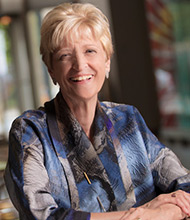Fall Letter November 2017

Fall Letter
November 2017
Dear Friends,
On Monday, October 2—my first working day as dean—I arrived at the Bloomberg School at 6:30 a.m. The School was quiet and still. I sat down for a moment in the student lounge and remembered my first visit to the School in 1972. My dad had waited for me right there, in that same space, while I interviewed with Alan Ross to become a doctoral student in Biostatistics. When I returned an hour later, I told my dad I had been accepted and had received a scholarship. He responded with an immense, beaming smile.
I savored the memory and reflected a bit on my journey to becoming dean. Then I headed to my office to get to work.
I have a terrific job. The Bloomberg School is thriving. Last year, the School enjoyed a wonderful Centennial celebration. And now, it is on the cusp of its next 100 years. I’m determined to do all that I can to make the School even stronger in its second century.
Ever since I learned that I would succeed Mike Klag as dean, I’ve been listening—to faculty and students, to alumni, staff, donors and others. People haven’t been shy about sharing their ideas, which has been great for me. My listening tour—which is still in progress—has reminded me of our remarkable global reach and the unrivaled breadth and depth of our faculty.
From everyone’s good counsel and wise words, I’ve landed on a couple of themes that will help me think about our future and make plans so we can have an even greater impact in the years to come: synergy and resilience.
We need to capitalize on the synergies that come with our School’s breadth and depth by continuing to find new ways to work across disciplines and departments—and schools across the University. The Bloomberg Distinguished Professorships, which emphasize such interdisciplinary research, are an excellent example of how to foster synergy. Being a Bloomberg Distinguished Professor is one of the great honors of my life—and it has helped me make new connections in my own research.
The launch of the Bloomberg American Health Initiative also provides a great example of how we can nurture faculty synergies. The Initiative, made possible by another visionary gift from Michael Bloomberg, is tackling critical 21st century public health issues—addiction and overdose, environmental challenges, obesity and the food system, risks to adolescent health, and violence—by drawing on the expertise of many departments across the School and recruiting new talent. Importantly, the Initiative facilitates collaborations inside and outside the field of public health, including experts from housing, criminal justice and education, to name a few. It can serve as a model for how to invest in faculty, students and a broad network of collaborating organizations and rally them to a common cause. It shows us how we can bring the very best science to an issue, driving programs and policies that make a difference.
Imagine the impact we can have by developing similar synergies to tackle other major health problems, here at home and around the globe. Over the next year, I look forward to working with our faculty, students, staff and alumni to define areas of excellence that cut across departments and could benefit from strategic thinking and investment.
Even as we constantly seek new opportunities, we should prepare for the challenges that lie ahead. I have come to appreciate the importance of enhancing our resilience as an organization. Our faculty are already amazingly resilient. In challenging economic times, they have responded with creativity and entrepreneurial zeal. But in addition to reacting well to crises, we should think explicitly and strategically about resilience. How do we bake resilience into who we are? We have the essential building blocks of a resilient organization: a binding sense of purpose; a diversity of disciplines, backgrounds and perspectives; and an ability to respond to rapid change by identifying new opportunities. To continue thriving, we need to build on this foundation and make sure we have the necessary human capital, infrastructure and financial resources. Another critical ingredient of resilience is adaptive leadership that can strike the delicate balance between risk management and mindful action on the one hand, and risk taking to ensure innovation on the other.
Our resilience undoubtedly will be tested in the coming months and years. We are all concerned by the increasing rhetoric centered on the rejection of science in the formulation of public policy, a resurgence of isolationism and, perhaps most disturbing, a disregard of tolerance for diversity in its broadest and most personal sense. My fervent hope is that despite the current climate, we will become an even stronger community and continue to advance the public’s health.
Synergies and resilience. Working with all of you, I hope to nurture both. We know that the future will bring opportunities and challenges—and we must prepare for both. I want to ensure that another student sitting in the student lounge today can one day become dean and inherit a School that’s in the strongest possible position to improve health here and around the world.
Warm regards,

Ellen J. MacKenzie, PhD ’79, MSc ’75
Bloomberg Distinguished Professor
Dean
PS – If you’d like to connect further, please contact me at JHSPH.deansoffice@jhu.edu.
